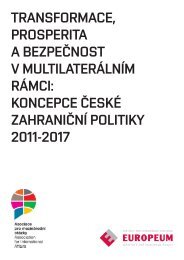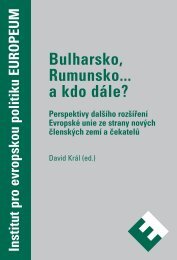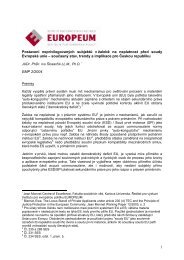eu constitutionalisation - EUROPEUM Institute for European Policy
eu constitutionalisation - EUROPEUM Institute for European Policy
eu constitutionalisation - EUROPEUM Institute for European Policy
You also want an ePaper? Increase the reach of your titles
YUMPU automatically turns print PDFs into web optimized ePapers that Google loves.
Chapter 7: Flexible Integration in the Common Foreign and Security <strong>Policy</strong>SUMMARYg From a legal perspective this contribution intends to elaborate on theinstrument of enhanced cooperation and the proposed specific mechanismsof flexible integration in the dynamic field of CFSP in the light ofboth, the currently applicable treaty of Nice and the envisaged regimeof the constitutional treaty.g While extending tools of differentiation to the sphere of CFSP is crucialgiven the fact that the principle of unanimity prevails, one has to strikea balance between the objective of increased efficiency and strengthenedunity, as well as between legal security and necessary ad-hocism.g The (still limited) option of taking recourse to mechanisms of flexibilityin the domain of security and defence neither replaces <strong>for</strong>mer instrumentsof flexibility nor does it preclude flexible integration outside thetreaty framework. However, the effective interplay of the new variantsdiscussed could spark off an integrationist process which may allow themost progressive member-states to proceed.I. INTRODUCTIONA. Intergovernmental sphereWhen looking at the envisaged procedure of norm-setting in the realmof the Common Foreign and Security <strong>Policy</strong> (CFSP) as enacted in theconstitutional treaty (TCE)¹ one has to observe, supposing that the TCEor parts of it eventually enters into <strong>for</strong>ce, that this traditional field of intergovernmentalcooperation faces fewer changes in this respect than onemight have expected. Decision-making in the Council remains dominatedby the principle of unanimity. The weak position of the Commissionand the <strong>European</strong> Parliament is preserved, thus rein<strong>for</strong>cing instead ofmitigating, important ingredients <strong>for</strong> the continuous lamentation onthe EU’s democratic deficit. The complete exclusion of judicial review1) The Treaty establishing a Constitution <strong>for</strong> Europe (TCE) was adopted by the 25 Heads of State andGovernment on 18 June 2004 in Brussels. Referenda in both France and the Netherlands rejected the textof the Constitution on 29 May and 1 June 2005 respectively. Currently a phase of reflection is under way.236Chapter 7: Flexible Integration in the Common Foreign and Security <strong>Policy</strong>by the <strong>European</strong> Court of Justice (ECJ) in the field of CFSP² illustratesthe weight of national interests wanting to preserve as much sovereigntyand autonomy as possible with regard to decision-making in externaland security affairs.³In sharp contrast to the detected lack of innovative approaches concerningthe norm-setting process, one may identify significant modificationswhen it comes to the legal effects which may originate from the futureConstitution in the field of CFSP. Above all, they stem from the proposedmerger of the pillars which, as a result waters down the established principleof supremacy of Community law over Union law⁴, as well as dueto the principles contained in Article III-308 TCE. These revisions lay thegrounds <strong>for</strong> a considerable extension of legal competences in the realm ofthe CFSP. However, <strong>for</strong> reasons of brevity I will refrain from elaboratingon this point any further.Despite of the projected abolition of the pillar structure and the morecoherent pooling of existing policy fields above all with regard to externalaction, the constitutional treaty does not abandon the intergovernmentalcharacteristic of CFSP, since procedural requirements such as the unanimityprinciple remain applicable. On the contrary, the intergovernmentalaspect will even gain momentum due to the new institutional qualityof the <strong>European</strong> Council together with its additional decision-makingcompetences and the introduction of specific rights to take initiativesattributed to the Union Minister <strong>for</strong> Foreign Affairs. From a legal perspective,the danger of abusive intergovernmentalism is limited by the principleof the single institutional framework and the principle of coherenceas enacted in Article 3 TEU. The <strong>for</strong>mer aims at establishing a balancedcoordination between the supranational sphere and intergovernmentalpolicy fields while the latter implies the obligation <strong>for</strong> compatibility or2) See SMITH (2001), pp. 79-104 (92).3) However, the competences of the ECJ in the sphere of CFSP have been partially extended in the frameworkof the Constitution. Following Article III-376 TCE “the Court shall have jurisdiction to monitor compliancewith Article III-308 and to rule on proceedings, brought in accordance with the conditions laid down inArticle III-365(4), reviewing the legality of <strong>European</strong> decisions providing <strong>for</strong> restrictive measures againstnatural or legal persons adopted by the Council on the basis of Chapter II of Title V.”4) The assumption that EC law prevails over EU law has been confirmed by the ECJ’s jurisdiction in casesLeifer, Werner and Centro-Com. See Case C-83/94, Leifer, [1995] ECR I-3231; Case C-70/94, Werner I,[1995] ECR I-3189; Case C-124/95, Centro-Com, [1997] ECR I-81. A different view is presented by WESSEL(2000), pp. 1135-1171.237








